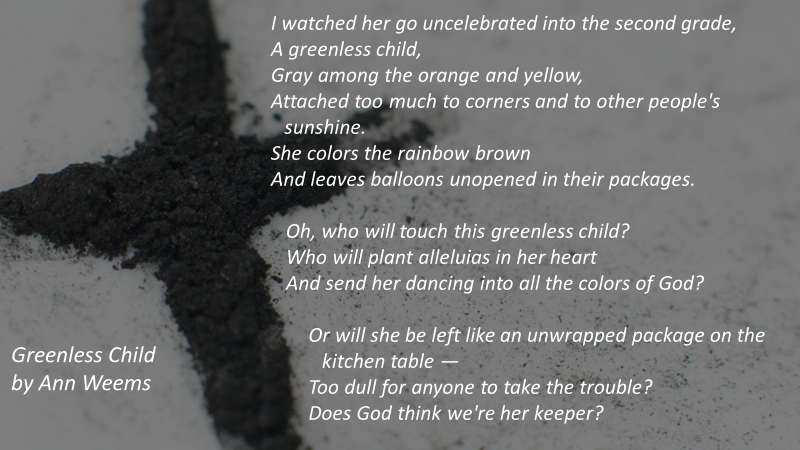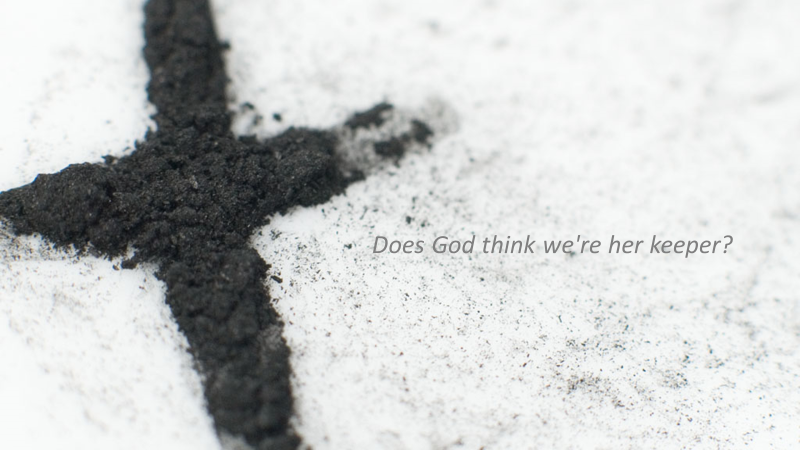Maggie Breen1 Samuel 15:34-16:13 † Psalm 20 † 2 Corinthians 5:6-10, 14-17 † Mark 4:26-34 You can view a video recording of this sermon here.
Isn’t that the case with so much of what we experience? We take something in, and we react, sometimes quietly, sometimes less so, but so often out of these hard-earned unspoken assumptions that have this silent power to affect our lives and the lives of others.
Rosebay Willowherb, for me, used to be a sign of something bad and only something bad. It grew in my family’s yard starting in the late spring and early summer each year. Those stubborn stems with their long, thin, rough, dark green leaves that seemed to me to spiral like a screwdriver or a drill making its way through the low growth. And then as summer moved on those loud pink flowers, one atop the other, clamoring for the sky. And bees, lots of bees, would hang out in that slanting swath of pink and then the flowers would turn to these long thin seed capsules that would split open seemingly overnight to reveal this tangled mess of tiny, almost invisible brown seeds hidden in a mass of silk hairs that would carry them off in clouds.
0 Comments
Maggie Breen Exodus 19:2-8a † Psalm 100 † Romans 5:1-8 † Matthew 9:35-10:8 (9-23)
A video version of this sermon can be found here. These are the names of the twelve apostles: first, Simon, also known as Peter, and his brother Andrew; James son of Zebedee, and his brother John; 3 Philip and Bartholomew; Thomas and Matthew the tax collector; James son of Alphaeus, and Thaddaeus; 4 Simon the Cananaean, and Judas Iscariot, the one who betrayed him. Ordinary people. Middle eastern men compelled by the words and the actions of Jesus. Something happens when we say a person’s name. We remember their humanity. Perhaps it’s the names of people we have placed on a pedestal: Andrew, James, Mary, Tabitha. We say their names and we remember – human just like us. Perhaps it’s the names of people brutalized: Emmett, Trayvon, George, Charlene. We say their names and we remember – human just like us. Human with gifts and hopes. Humans: beloved of God. There is a phrase in this week’s gospel that with some other phrases in these sacred texts have been used by Christians over time to set humans apart. Maggie BreenIsaiah 58:1–12 † Psalm 51:1-17 † 2 Corinthians 5:20b—6:10 † Matthew 6:1-6, 16-21 Does God think we’re her keeper? It’s a bold question. I watched her go uncelebrated into the second grade, A greenless child, Gray among the orange and yellow, Attached too much to corners and to other people's sunshine. She colors the rainbow brown And leaves balloons unopened in their packages. Oh, who will touch this greenless child? Who will plant alleluias in her heart And send her dancing into all the colors of God? Or will she be left like an unwrapped package on the kitchen table -- Too dull for anyone to take the trouble? Does God think we're her keeper?
Maggie BreenActs 9:36-43 † Psalm 23 † Revelation 7:9-17 † John 10:22-30
I might just have been in a bad mood, but there were a couple of things about this Acts text that, on first read, kind of bothered me. Tabitha, a devoted woman, loved for making clothes for the poor, gets ill and dies. They find Peter, he prays and she comes back to them. It just seemed well, too neat; too easy. Too easy for this woman to be called back into her assigned role – at home helping. Too easy for the rest of the community to avoid their responsibility for some of the work. Too easy to look for a supernatural answer to their problems. Too easy to get a result, a restoration, when so many others, so many of us, have to struggle through loss, and have no option but to get used to new heartbreakingly difficult realities. Maggie BreenZephaniah 3:14-20 † Isaiah 12:2-6 † Philippians 4:4-7 † Luke 3:7-18
Well that was quite a turn wasn’t it. From the smooth certain assurances of the psalm: “Surely, it is God who saves me; I will trust and not be afraid. For the Lord is my stronghold and my sure defense, and God will be my Savior.” And from the bright jubilation of Zephaniah: “Sing aloud, O daughter Zion; shout, O Israel! Rejoice and exult with all your heart, O daughter Jerusalem! The Lord has taken away the judgements against you, he has turned away your enemies. The king of Israel, the Lord, is in your midst; you shall fear disaster no more.” And from the lovely appeal for gentleness and patient prayer in Philippians: “Rejoice in the Lord always; again I will say, Rejoice. Let your gentleness be known to everyone. The Lord is near. Do not worry about anything, but in everything by prayer and supplication with thanksgiving let your requests be made known to God.” From all of that to John: “You brood of vipers – who told you to flee from the time to come…..His winnowing-fork is in his hand, to clear his threshing-floor and to gather the wheat into his granary; but the chaff he will burn with unquenchable fire.’” Maggie BreenGenesis 2:18-24 † Psalm 8 † Hebrews 1:1-4, 2:5-12 † Mark 10:2-16
Did you catch that little phrase at the beginning of Mark’s passage, “and to test him they asked...” I think that’s what bothered me the most about this text. And it took a while for me to get there because there was a lot that bothered me. But when I took some calm reflective time to read it well, I realized – it’s that phrase. “and to test him they asked……” As I read this text from Mark, I realized I was looking through the centuries to see these men, these pharisees, dragging something that has intimately affect me, a divorced woman, into the public square, for their own agenda: to test Jesus – to have him, this dissident, weigh in on a hot topic of the day – to score some points against him, and hopefully discredit him. And frankly it made me mad. And even though this story is from another time, my anger is not misplaced, because that’s how these stories work. Yes, the men from these texts, together with the women seldom mentioned, are in a different time and place. They are working with different laws and different cultural norms, but they do and say things that work to collapse our stories into each other. They speak to us of things we know about, care about, and they invite us to add our voices, to bring our experience, and to work with them, with God, and with each other to try to get to what is good and what will help us be well. Maggie BreenJoshua 24:1-2a, 14-18 † Psalm 34:15-22 † Ephesians 6:10-20 † John 6:56-69
The Hubris of good Intentions. That’s how one author[i], characterizes the force central to the story of the social media giant Facebook. Author and University of Virginia scholar Siva Vaidhyanathan is among scholars examining the way that social media keeps us from the work of real community building and the type of face-to-face constructive problem solving that makes for a vibrant democracy. This is a conversation that has become louder in the last year or so as we get increasingly clearer glimpses, and first-hand experience, of all manner of ills that me must guard against as we engage social media. Everything from a momentary vent of emotion from a well-meaning friend that can escalate into an embittered and hurtful debate to sophisticated nation-sponsored propaganda that has serious implications for the way we are governed. But the phrase that this author uses to try to help us understand the story of how we got here really caught my attention. The hubris of good intentions. A friend and I were talking this week about how so often the thing we call out in others, that thing that offends us so much, just rub us the wrong way, or that turn of phrase that makes us doubletake as we are reading or talking with others, is ironically, so very often, something that powerfully exists in ourselves, something our sub-conscious knows to be true for us too, even as it somehow offends us when we see it in someone else. In some strange way, maybe it’s the Holy Spirit at work , but the thing that catches our attention is oftentimes, it seems, something that we might want to look at in ourselves – something we can or need to learn from or learn about. Maggie Breen1 Kings 19:4-8 † Psalm 34:1-8 † Ephesians 4:25-5:2 † John 6:35, 41-51
No-one gets to move through this life Scot-free.[1] No, not even the Scots. We are a charmed people it’s true, but even we, must at some point, reckon with what ours to face, ours to do. Did you know that scot in “scot-free” refers to a tax? No, I didn’t either, until I looked it up – bless you: credible sources on the internet! Here in this country we sometimes associate scot-free with the important story of Dred Scott. An 19th century American held as a slave in Virginia who first sued for his freedom in 1847 and after ten years of appeals finally ended up in the Supreme Court, but was denied the right to a trial in a federal court because of his status as a slave. His case influenced Lincoln’s nomination and of course, our country’s history. Maggie BreenEzekiel 2:1-5 † Psalm 123 † 2 Corinthians 12:-10 † Mark 6:1-13
So I lead a bit of a double life. I have since I started in this work of ministry. I work part of my time here at St Andrew thinking and learning with you all about how we offer our gifts for the sake of compassion and justice and peace, and for part of the time I work outside of this congregation thinking and learning with others about how the church and people of faith best show up and partner to make a difference in the world. This arrangement is partly by necessity. The church is changing, and pastors’ jobs must look different if we are going to be sustainable. And it’s partly, maybe more so, by design. Jobs like mine and Julie Kae’s, and many others in bi-vocational roles, help position the church to be in closer conversation with how this life we proclaim gets lived out and what we can learn from the Spirit as it is at work in the world. Currently the work outside of the walls of the church has me at Seattle University working with scholars and practitioners to see what we can learn around what it takes for congregations, and faith-based service organizations, advocacy groups, and community organizers to be effective in moving society towards one where all neighbors are able to flourish. In the course of this work I get to talk with all sorts of people. I get to hear from leaders and activists and ordinary folks of all stripes about the work they are called to, what they are challenged by and what they are learning as they meet these challenges in innovative and life-giving ways. On Friday, I was sitting with two folks who work with an organization that has been on the streets caring for those with no safe place to go for years and years. They are out of a tradition that has the care of unhoused neighbors deep in their DNA. They work long hours and are grounded in a deep faith and prayer life. They have extensive partnerships and are looked to by their local police, hospitals and government as a reliable place to turn to when no one else can help. And on the spectrum of progressive to conservative, liberal to evangelical, it is pretty widely known that their tradition sits, for the most, part right of center. Maggie BreenJob 38:1-11 † Psalm 107:1-3, 23-32 † 2 Corinthians 6:1-13 † Mark 4:35-41 My Kids and I were watching Iron Man 3 on Friday night. We are working our way through Marvel movies – escaping the news, looking for the good guy, enjoying the quick wit. We were laying on various couches when the scene turned to Pepper Potts, the hero’s very capable assistant and now girlfriend. She was driving a car, fleeing a dangerous scene, with another woman Maya Hansen in the passenger seat. Maya is a brilliant scientist and previous acquaintance of the aforementioned hero – Mr. Stark. One woman turns to the other and they talk very briefly about the work in which the woman scientist is engaged
Molly pointed from her couch and gasped – oh, I think this means this movie passes the feminist movie test. Wait, what? There is a feminist movie test? Yes, she explained there is this test used to rate movies. You ask of a movie – does it have two women in it, does they have names, and do they talk to each other about something other than their thoughts or their relationship with a man. In that one scene Iron Man 3 just scraped over the bar. This test it turns out is called the Bechdel test. |
St. Andrew SermonsCategories
All
|




 RSS Feed
RSS Feed